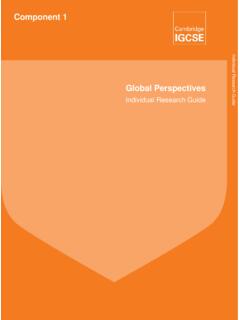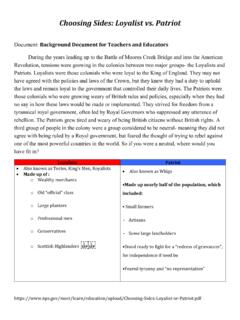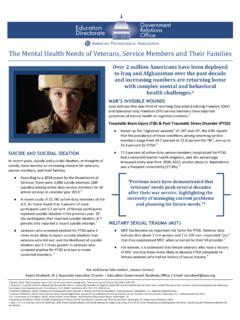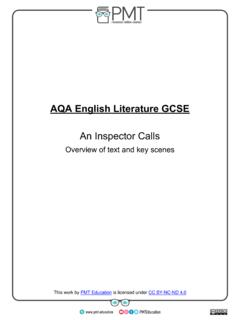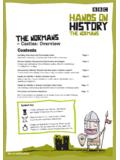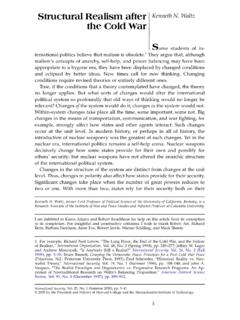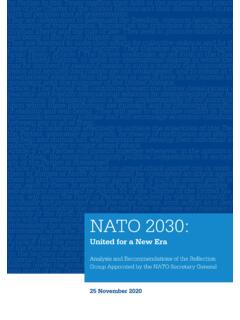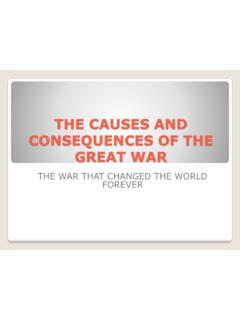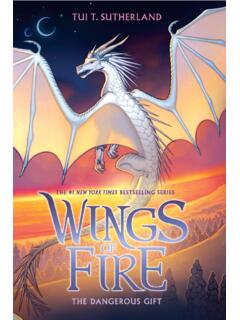Transcription of Scheme of work - Global Perspective
1 Cambridge IGCSE [Subject] ([syllabus code]) 2Y02 Cambridge IGCSE [Subject] ([syllabus code]) 1 Learning plan Cambridge IGCSE Global Perspectives Learning plan Cambridge IGCSE Global Perspectives Cambridge IGCSE Global Perspectives 2 Contents Overview .. 3 Global Perspectives Framework Diagram .. 5 Questions/Issues for Investigation .. 6 Unit 1: Belief Systems .. 7 Unit 2: Conflict and Peace .. 11 Unit 3: Disease and Health .. 19 Unit 4: Education for All .. 24 Unit 5: Family and Demographic Change .. 32 Unit 6: Language and Communication .. 37 Unit 7: Law and 42 Unit 8: Water, Food and Agriculture .. 45 Learning plan Cambridge IGCSE Global Perspectives Cambridge IGCSE Global Perspectives 3 Overview This Scheme of work provides the construct for Mr Johnson s Cambridge IGCSE Global Perspectives course. The syllabus has been broken down into units with teaching and learning activities and resources for use in the classroom, or as supplements for homework or other assignments.
2 This course has been personalized to fit the context of Busan International Foreign School to ensure that students are given plenty chances to develop and apply the skills required throughout this course. This course encourages you to be aware of Global issues and offers opportunities to explore possible solutions through research, cooperation and collaboration. It promotes an open-minded approach to the complexities of the world and human existence. Recommended prior knowledge Students will bring their own experiences and opinions about many Global issues to this course. They should have an awareness of different sources of information that will be useful for this course and also an understanding of the differences between Global , national, local and personal perspectives on a Global issue and how they are interconnected. The course emphasizes the development and acquisition of skills with topics acting as a vehicle to develop these skills. Outline The 20 possible unit choices from within IGCSE Global Perspectives are: Belief Systems Biodiversity and Ecosystem Loss Climate Change Conflict and Peace Disease and Health Education for All Employment Family and Demographic Change Fuel and Energy Humans and Other Species Language and Communication Law and Criminality Poverty and Inequality Sport and Recreation Technology and the Economic Divide Trade and Aid Tradition, Culture and Identify Transport and Infrastructure Urbanization Water, Food and Agriculture Within the units, teaching activities focus on Whole class (W), Group work (G) and Individual work (I).
3 The activities are introduced with Focus questions which are examples of the sort of questions that will be used to prompt prior knowledge, start discussions and build upon your course portfolio. Within the units Group Project activities the opportunity to work collaboratively with classmates and students from other schools. Individual Research activities are focused task to better help students apply research skills individually. And, Extension activities challenge students to dig deeper into a particular topic. These give students ideas and experience of the type of work required for the Group/Individual Research in Grade 10. Cambridge IGCSE Global Perspectives 4 Online resources Each unit has a comprehensive list of online resources. Below is a list of some general websites that may be useful. NOTE: this is a research-oriented course, so a variety of reliable resources and knowledge were to retrieve information is vital. BBC news CAFOD Convention on Biological Diversity Information about countries world-wide.
4 CITES Convention on International Trade in Endangered Species of Wild Fauna and Flora US news channel Conservation International USA Environmental Protection Agency Friends of the Earth Forestry Stewardship Council Data and maps on a range of Global issues Provides links to many websites comparing countries Global education website Greenpeace International Red Cross and Red Crescent The Intergovernmental Panel on Climate Change World Conservation Union Make Poverty History campaign New Internationalist Guides to Global issues, including conflict and peace Oxfam Interactive mapping and statistical information UN main website UN Development Program UN Environment Program UN Foundation Information on countries UN Millennium Development Goals The World Bank World Health Organization World Wildlife Fund Cambridge IGCSE Global Perspectives 5 Cambridge IGCSE Global Perspectives 6 Questions/Issues for Investigation Topic Global /International Perspectives Local/National Perspectives Family/Personal Perspectives Belief Systems Why do people have different belief systems?
5 What are some of the different belief systems held in different countries? How do belief systems affect a country s political system and culture? What are the different belief systems in my country and in my community? How do these belief systems affect the nature of the local community? Is respect shown for other people s beliefs? What differing beliefs do my friends and family have? How do these beliefs affect their behavior and how other people view them? Have my own beliefs changed over time? Conflict and Peace Why do wars and conflicts Which groups seem to be What causes conflicts begin? Are wars an inevitable part of being human? Where is there conflict in the world today? What is the role of the UN in times of conflict? in conflict within my own country or community? Is it their interests or ideas that are conflicting? What political/ ethical systems enable people to live with their differences? between me and my family or peers? How are these conflicts best resolved?
6 How can this help me to understand conflict on a wider scale? Disease and Health How do infant mortality How good are my local health What can I do to keep rates and expected life spans compare in different countries? What are the reasons for this? What are the major health problems facing the world today? Is access to good health care a right? care and sports facilities? Are they equally available to everyone? Which people in my locality have the greatest health care needs? How well does my community cater for people with disabilities? myself healthy? Do I have a responsibility to keep myself healthy, and if so, why? Where should I go if I have a health worry or need advice about staying healthy? Education for All What is education for? What is the relationship between a country s wealth and its rate of literacy? What effect does illiteracy have on a person and on a country? Does everyone have the right to an education? What types of education are available in my area?
7 Who uses them? How is education funded? What are the educational options available for people with learning difficulties or physical disabilities? How much do I value my own education? What do I most want to learn as I grow older? If I could change the education system, what changes would I make to the curriculum? Family and Demographic Change Why do some countries What sorts of families live What responsibilities do my have a high proportion of in my local area? What parents have to me? What children or elderly people? What difficulties can this cause? What is a family ? What responsibilities do family members have to one another? How or why has the family changed? proportion of households are single people? Has this changed in recent decades? What support is there in my area for families in need? How is this funded? responsibilities do I have to them? What sort of parent do I want to become, if at all? How would I choose to be cared for when I am elderly? Language and Communication How has the internet How do people in my country How does the way I transformed the world?
8 Why is it not always easy to make yourself understood in another country, even if you speak the language? Do other societies have different means of communication to those available in my country? communicate differently with each other? How does the role of the media affect political decisions in my country? What investment has my country made in communication systems? communicate with my family and friends differ? How easy is it to be misunderstood? Why is it important to speak other languages? Law and Criminality Why do people make laws? What are the crime rates in Do I or my family or my Do we need laws? What causes some people to break laws? Who decides which laws should be in force? What are the problems caused by different law systems in different countries? my country/community? What are the major crimes? What schemes are there to protect people from crime? How effective is the national/local police force? friends break any laws? Do I feel safe in my local community?
9 Has crime affected me or my family and friends? Can I do anything to help prevent crime? Water, Food and Agriculture Why do some countries have an inadequate supply of clean water? Why do some countries have a surplus of food and others do not have enough food? How can growing genetically modified (GM) crops solve food shortages around the world? What foods are important in my community and why? What emergency measures are in place for coping with droughts and floods in my community or country? What causes famine and drought and how do they affect my community? How much water do I use each day and for what purpose? How much food does my family waste each day and why? What decisions does my family have to make about food on a daily basis? Learning plan Cambridge IGCSE Global Perspectives Cambridge IGCSE Global Perspectives 7 Unit 1: Belief Systems Recommended prior knowledge Students will bring their own experience of belief systems and that of their family and friends to this unit.
10 They may have specific beliefs that inform their everyday lives. They may have strong opinions about issues in this topic. There are links with Unit 2 Conflict and Peace and Unit 5 Family and Demographic Change. Context This unit provides many opportunities for individual research work and collaborative work for the Group Project. Students are encouraged to share their work and findings with others in the class as they explore issues and undertake research. Outline This unit gives students the opportunity to consider people s differing beliefs and the effects these have on their lives. It also encourages them to consider the interactions of people with different beliefs. As with all Global Perspectives work, students will be given opportunities wherever possible to research and critique sources of information, present findings appropriately, develop opinions and evaluate information and perspectives. Personal reflection time on their work is important and opportunities to do this are built into the planning.
